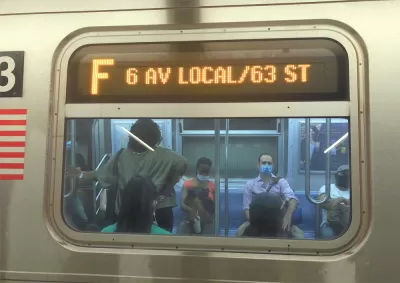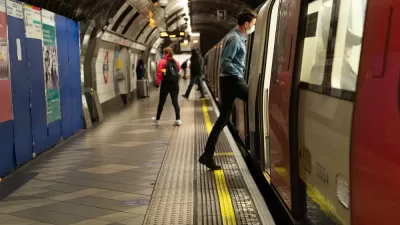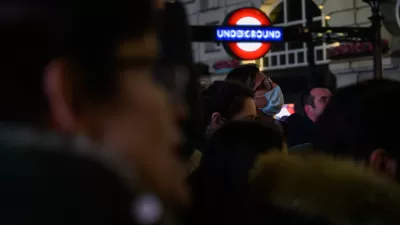Recent analysis by TransitCenter quantifies the effects of the pandemic for the 150 largest U.S. transit systems.

TransitCenter presents data on the operations of public transit agencies during the COVID-19 pandemic—finding ongoing evidence of sweeping service reductions in almost every part of the country. Some cuts have been deeper than others, however, as transit agencies have delt with declining ridership (and the farebox revenues that come along with riders)—whether due to disrupted commute patterns or stay-at-home orders—and the public health risks posed to operators.
TransitCenter analyzed data from National Transit Database monthly data to provide the following summariy of the state of public transit in the United States at the conclusion of the pandemic year, 2020.
Of the 150 largest transit agencies, about one in six were providing less than 75% of their pre-pandemic service hours in December 2020. Meanwhile, nearly a quarter were running between 90 and 100% of pre-pandemic service, and 27 agencies were running more service than they were before the pandemic as part of providing socially distanced transit.
Among those aggregated figures, TransitCenter also notes big differences between the largest agencies. While some have been able to restore most of the service cut in spring of 2020, some have struggled to restore service. The San Francisco Municipal Transportation Agency (SFMTA) has dealt with technical challenges restoring Muni Metro service, for example. The Maryland Transit Administration was operating just 66 percent of its pre-pandemic capacity in December, according to the article (after stopping short of cutting service even deeper). At the other end of the spectrum, Phoenix is operating more transit service than before the pandemic.
Breaking down the data by mode, TransitCenter reports that service has been cut most deeply for commuter rail—indicating one potential outcome of the long-term effects of fiscal stress and migration patterns of the pandemic.
FULL STORY: How Much Service Are Transit Agencies Running During the Pandemic?

Planetizen Federal Action Tracker
A weekly monitor of how Trump’s orders and actions are impacting planners and planning in America.

Maui's Vacation Rental Debate Turns Ugly
Verbal attacks, misinformation campaigns and fistfights plague a high-stakes debate to convert thousands of vacation rentals into long-term housing.

Restaurant Patios Were a Pandemic Win — Why Were They so Hard to Keep?
Social distancing requirements and changes in travel patterns prompted cities to pilot new uses for street and sidewalk space. Then it got complicated.

In California Battle of Housing vs. Environment, Housing Just Won
A new state law significantly limits the power of CEQA, an environmental review law that served as a powerful tool for blocking new development.

Boulder Eliminates Parking Minimums Citywide
Officials estimate the cost of building a single underground parking space at up to $100,000.

Orange County, Florida Adopts Largest US “Sprawl Repair” Code
The ‘Orange Code’ seeks to rectify decades of sprawl-inducing, car-oriented development.
Urban Design for Planners 1: Software Tools
This six-course series explores essential urban design concepts using open source software and equips planners with the tools they need to participate fully in the urban design process.
Planning for Universal Design
Learn the tools for implementing Universal Design in planning regulations.
Heyer Gruel & Associates PA
JM Goldson LLC
Custer County Colorado
City of Camden Redevelopment Agency
City of Astoria
Transportation Research & Education Center (TREC) at Portland State University
Jefferson Parish Government
Camden Redevelopment Agency
City of Claremont





























